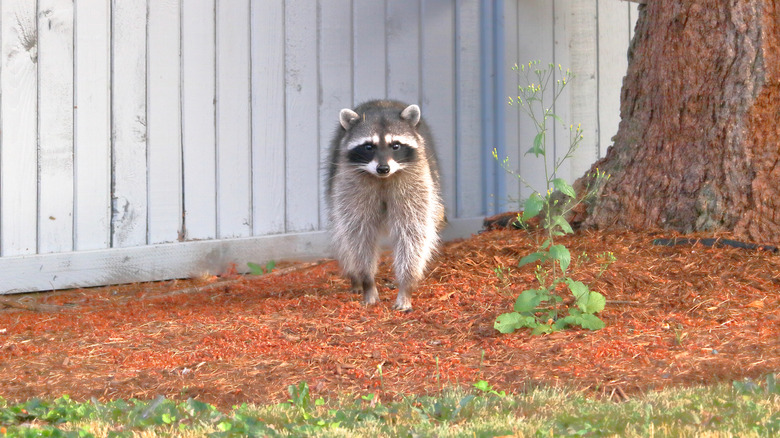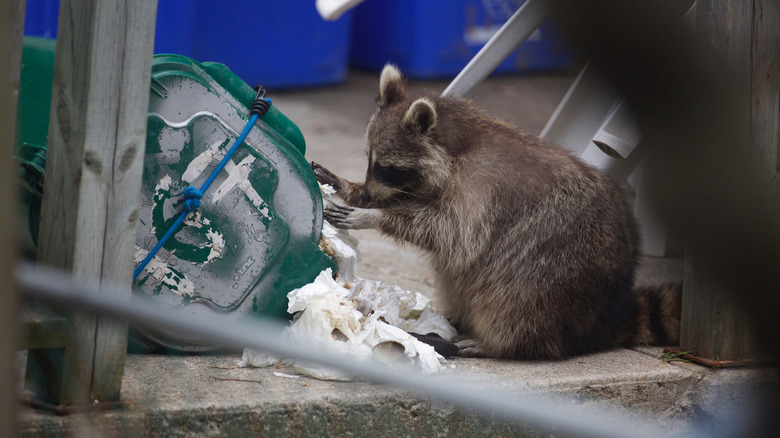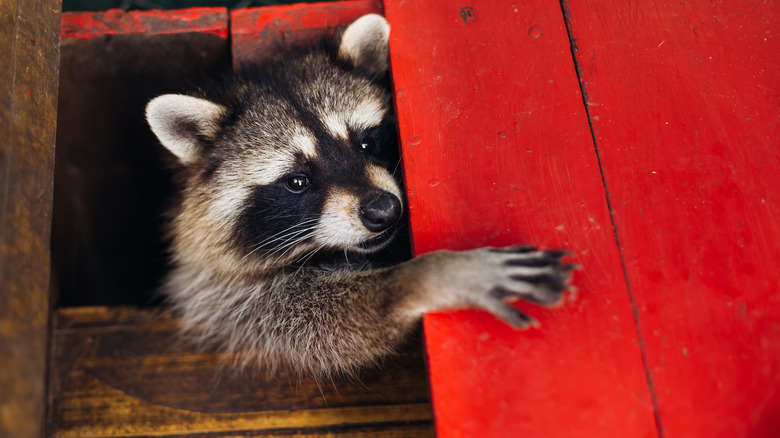An Expert Explains Humane Methods For Keeping Raccoons Out Of Your Yard
Raccoons are one of the most damaging pests to have in your yard or home. With how adapted these small mammals have become to people, it can be hard to fend them off and prevent them from entering a property. Some signs that a raccoon has been taking advantage of your hospitality include hearing scratching and chattering noises, noticing droppings, and seeing tiny hand-like footprints scattered about. Conservation Scientist and Naturalist Charles Van Rees, Ph.D., offers guidance on how to prevent raccoons safely and what might be attracting them in the first place.
"For the first point, raccoons are highly omnivorous, meaning that they eat all kinds of different foods, and opportunistic, meaning that they will eat whatever they can get their cute little hands on," Van Rees told House Digest exclusively. "The most typical food sources in backyards are outdoor food dishes for pets, compost piles, and garbage bins." Van Rees noted that smells can still attract raccoons even if your compost and trash bins are well secured, but the critters will eventually give up trying to get unattainable food. Even if you believe raccoons coming and going are harmless, you should be wary of their presence and know what damage they could do and how to divert them without causing harm.
Dangers raccoons can present
While raccoons pose many different issues, Van Rees points out that the spread of disease, especially to our beloved pets, is a particular risk to be concerned about. "Relatively high proportions (I've read up to 20% in health journals, though that sounds like a lot) of sampled raccoons tested positive for rabies, which is a concern for animals and people," he said. "I don't think this means that 1 in every 5 raccoons is rabid; however, it probably means that 1 in 5 raccoons that get reported to authorities and subsequently tested tends to be affected." It is a common myth that if raccoons are seen in daylight, they are rabid. However, if you notice a raccoon being unbalanced, lethargic, injured, or frothing at the mouth, you should immediately call the proper authorities and stay clear of its path.
Van Rees reports that raccoons aren't a considerable risk to vegetable gardens and prefer "protein-packed foods like grubs or chicken's eggs." They will target "large fruits like apples or peaches" and are drawn to "pet food and discarded meats in the garbage." He noted that water sources, especially with fish, are also bound to cause trouble. Be mindful that raccoons can damage your home, too, by digging shelters in your roof, insulation, and even HVAC systems. Homeowner insurance doesn't typically cover animal pest damage, so it is essential to take preventable measures that keep raccoons from making your home their new abode.
Safely preventing raccoons long-term
Given that raccoons are known to carry diseases, you mustn't attempt to remove one yourself physically. "No one without professional training should ever approach or handle raccoons or any other wildlife," Van Rees reported. "It is inevitably dangerous for both people and wildlife and in some cases is even illegal." He went on to explain that the simplest way to keep out raccoons is by minimizing the presence of things that attract them and make it hard for them to enter your property. "If you happen to spot one or more raccoons, it's actually a better idea to stay quiet and watch their behavior than it is to try and scare them off or let them know your presence," he said. "You can learn a lot more about why they are in your yard by sitting back and watching. If you get the chance to gather some intel, you might figure out whether they showed up to steal extra cat food for sleep under your porch."
Van Rees points out that "large cavities in trees" and sheds will be attractive raccoon shelters and nesting options. He also mentions that attics and basements are other viable locations they might try to dig into, so it's wise to make those areas as inaccessible as possible. Along with preventive measures, installing motion-censored sprinklers, lights, and sonic deterrents can be productive in scaring them off and keeping them from returning.


